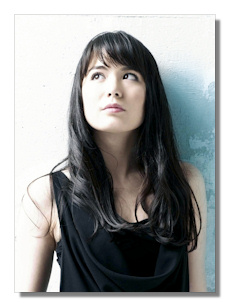
The Internet's Premier Classical Music Source
Related Links
- Latest Reviews
- More Reviews
-
By Composer
-
Collections
DVD & Blu-ray
Books
Concert Reviews
Articles/Interviews
Software
Audio
Search Amazon
Recommended Links
Site News
 Concert Review
Concert Review
Piotr Ilyitch Tchaikovsky

- Piano Concerto #1 in B Flat minor, Op. 23
- Symphony #5 in E minor, Op. 64
Alice Sara Ott, piano
Russian National Orchestra/Mikhail Pletnev
Munich, Gasteig, 26 January 2015
Mikhail Pletnev is an enigmatic conductor. Each time I have heard him in concert with his Russian National Orchestra he left quite a different impression than with his recordings. While in his discs he often sounds cold, underwhelming or merely eccentric, live I always found him a lot more exciting and even revelatory in the Russian repertoire. This time again, in a Munich concert, his traversal of Tchaikovsky's Fifth was a gripping experience, offering remarkable musical insights and a sonority that convinced you he was really providing us a look into the composer's soul. Or how ultra-familiar music can still surprise.
A major difference with the discs is that in concert the Russian National Orchestra (RNO) sounds indeed like an echt Russian formation. The polished (or I would rather say clinical) sonority heard on the Deutsche Grammophon discs was considered a distinguishing feature of this post-Soviet era orchestra – and for many Western ears a relief to the raw, closely miked, sometimes unsophisticated sound associated with the traditional Russian bands. Pletnev and the RNO were better served in their recent Tchaikovsky symphonies cycle by the Pentatone engineers than by the descendants of Emil Berliner, but even these new high-resolution recordings seem to be a far stretch from the real thing. The raspy, very powerful brass, the rugged timpani, the characterful, dark woodwinds and gutsy strings one can hear in concert, leave very little doubt about the origins and pedigree of this formation.
The orchestral balance, too, seemed worlds away from the brittle, string-dominated recordings. In this Munich concert the balance was superbly judged throughout, leaving no detail of Tchaikovsky's orchestration in the dark. The Fifth Symphony is one of his most polyphonic works and Pletnev definitely knows his way through it. From the opening bars the presence of the woodwinds was striking and just as the brass they would color the whole symphony, not only in prominent solo parts but also in harmonic support or decorative counterpoint. Strings were divided, with cellos in the center and basses to the left. Pletnev coaxed some unforgettable moments this way: where can you hear such a pitch dark ending to the first movement, with clarinets and then bassoons dying out above the lower strings? In the mesmerizing opening of the 2nd movement the horn solo was well played, but one was just as captivated by the carefully woven string canvas supporting it. Remarkably, in the 2nd movement it was not so much the loud, powerful climax which hit hardest, but rather the following clarinets and bassoons eerily floating above horns and trombones. When Pletnev arrived at the coda of that movement he had created a deeply moving feeling of no-return.
The Waltz, rendered with great elegance and warmth, brought some relief. In the trio Pletnev reminded us of the link with the ballet The Sleeping Beauty, composed shortly afterwards, just as the equally contemporary opera The Queen of Spades wasn't far away in the lyrical passages in the symphony.
True, as on his discs tempos were handled very liberally, shifting all the time yet in general they contributed effectively to Pletnev's intensely tragic vision of the Fifth. Only in the final movement his pushing and pulling verged on affectation and ended up being counterproductive. Overall, though, this was a greatly compelling rendition of the Fifth, meaty, passionate Tchaikovsky in fact, but with the genius of the composer as an orchestrator in a fine balance with his gifts as a melodist.
This all-Tchaikovsky concert opened with a pleasant surprise. A promotion campaign with posters around the city announced months in advance pianist Khatia Buniatishvili as the soloist for the First Piano Concerto, and indeed as the main attraction of this concert. Eventually, however, it was Alice Sara Ott who took the stage, replacing apparently at the very last moment an ailing Buniatishvili. With no rehearsal time granted, Ott bravely jumped in and delivered all the goods, and then some.
There was clearly a sense of occasion here which immediately put to rest any doubts about lack of preparation or focus. The opening may have been casual but once the movement got under way Ott's trademark blend of fire and sensitivity, and in this concerto of dramatic exuberance and tonal polish, came into play. The bravura passages were delivered excitingly fast but without loss of clarity, precision or weight. Ott knows how to vary sound, whether in soft passages or in stormy ones. The cadenza was superbly built. Her seriousness as an artist was further emphasized by her interaction with the orchestra, most tellingly so in the Andantino semplice – rehearsed or not, this was a magnificent performance leaving nothing to be desired.
Many undoubtedly had bought tickets on the mere strength of Khatia Buniatishvili's star power, but in the end there was no reason to regret her cancellation. Alice Sara Ott, as the savior of the day, was the main attraction and deservedly got a thundering ovation.
Copyright © 2015, Marc Haegeman












